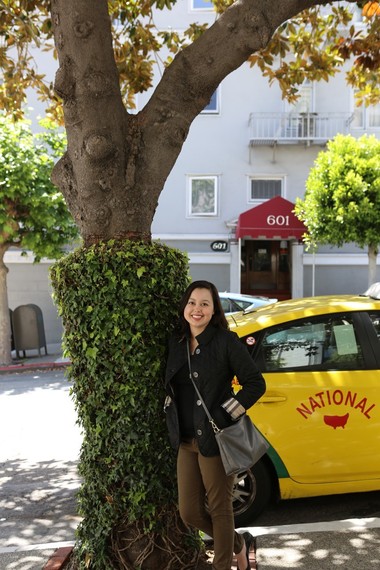About 1.3 million people in the U.S. live with rheumatoid arthritis (RA), a serious autoimmune disease that occurs when your immune system mistakenly starts attacking healthy joints. The true struggle of living with autoimmune disease is known to people experiencing the pain daily and to family members and caregivers.
Among them is Miami native Stephanie Aleite, who was diagnosed with rheumatoid arthritis when she was only five years old. I met with Stephanie during her recent visit to Crescendo Bioscience where she spoke about living with RA and how she discovered Vectra DA, the blood test that changed her life.

Juliet: You were very young, only five when your parents discovered you had RA disease. When was the first time you realized that it would affect your future?
Stephanie: I was 17 years old when I first realized RA would affect my future. At the time, I was in college and dating my husband when suddenly, I began feeling pain in my knees that wouldn't go away. Although my parents discovered I had RA when I was 5 years old, they didn't know much about it. When I was young, I was fortunate because I responded so well to treatment that my disease went into remission for most of my teenage years. At the time, my former rheumatologist and my mom thought that my remission would last my whole life. So they felt they had no reason to tell me about a disease they thought was part of my past. But when my RA came back, it came back with a vengeance and it was then that I realized my dreams of being an architect would never come true because of how RA affected my hands. I still love architecture, but have found my life's purpose in helping others like me.
One thing RA has taught me is not set my future goals with time limits. 1. Have my Master's degree by 23. 2. Have a child by 25. Well, I'll be 25 in a month and I still haven't achieved any of these! Although, my illness has prevented me from accomplishing these goals, I have had other victories; like walking around the block, cooking my husband dinner, or even travelling around the US speaking publicly about my journey. RA has taught me to celebrate all victories in life, big or small.
Juliet: What are some of the symptoms people diagnosed with RA disease experience?
Stephanie: People with RA usually experience similar symptoms, but the range can be very wide. For example, all of us experience the intense pain, unrelenting fatigue, stiffness and awfully huge swollen joints, but some can even experience symptoms relating to their heart, lungs, stomach and even eyes. Most people don't realize that RA can affect organs in addition to joints. For me personally, three years ago I was also diagnosed with Gastroparesis, a stomach condition that my doctor believes is related to my RA. Since then, we've "treated" my Gastroparesis by continuing to treat my RA, which, oddly enough, has helped. All that said, I believe that everyone with RA is different.
We fight the same disease, but we each have our own unique battles. No two people with RA are the same, but we all have hearts like warriors.
Juliet: Any home remedies that you use that help you to lessen the pain?
Stephanie: I use my hot pack every day for stiff and painful joints, especially for my back and hips. I also use a lot of ice packs for when my knees and hands get swollen. They help a lot.
I recently tried yoga to help me deal with my worsening back and hip pain. I'm only a beginner, but so far it has helped tremendously with the "tin-man" feeling in my stiff joints. It has also helped strengthen the muscles surrounding my joints, which I believe, helps lessen my pain a lot, especially in weight-bearing joints such as my knees.
Juliet: You mentioned you discovered MyRA, then the Vectra DA test while in the infusion room. Please share that story with us.
Stephanie: Yes, I was receiving an infusion one day, when my husband picked up a brochure for the MyRA symptom tracking app. Previously, I had received in the mail one of those calendar booklets for tracking symptoms and found I couldn't stick to it, especially when my hands were swollen and I couldn't hold a pen. So I downloaded the app and really liked how easy it was to use. My husband also noticed that the creators of the app also had developed a blood test for people with RA. So, we told my doctor, who was already familiar with the test, that we'd like to try it and he agreed. At first, I was terrified that my score would reflect that I was wrong about how severe I felt my pain and stiffness was, but when I got my score back, I was shocked at how synchronized (or in line) it was with how I told my doctor I was feeling.
Juliet: What role does Vectra DA play in your life today?
Stephanie: Vectra DA has played a huge role in my disease management, as well as boosted my confidence. Being young, it has been very difficult dealing with people's perception that because I don't "look sick," that I'm "not sick."
However, having a blood test that measures how active my RA is on a number scale has helped me to have confidence in myself and given me the confidence to speak more openly with my doctor. Vectra DA sets a number score to a pain that is sometimes difficult to describe. It validates exactly how I feel without me having to convince people that I really am sick. It also gives me confirmation when I'm feeling better!
Juliet: Being disabled at 21 and fighting the pain that no one can understand, how do you manage to carry that beautiful, positive smile on your face? What drives you, gives you that positive energy?
Stephanie: It doesn't come easily, I'll tell you that. I used to say that having a chronic illness forces you to go through the 5 stages of grief over and over again. I don't say that anymore, because I've learned to catch myself acting in denial of my physical limitations or being angry with them. Over the years, I've learned to embrace the fact that RA is a part of my life. It takes time and a lot of practice.
One of my tricks is allowing myself moments of weakness. I don't deny myself pity parties or bouts of "the blues," but I set limits. I allow myself one day to mope and then promise that tomorrow is a new day and I will wake up feeling better. Having a blog also helps. The hope that my writing will help someone else with a chronic illness or disability gives me a sense of purpose. I now feel that my suffering isn't for nothing, but for the prospect that I can share my experience and learnings with others, in hopes that they will live a better life.

Juliet: I noticed that you decorated your cane to match your outfit, and I love that! What is something you want non-RA sufferers to know?
Stephanie: While I haven't really needed my cane for over a year now thanks to the treatments I'm on, I still keep it in my closet, right next to my go-to ballet flats and my cross-body bag. Although two of those items you might find in any young woman's closet, all three of these objects represent my disability and who I am as a person. For example, when I first started relying heavily on my cane, I was mortified. In just a few short months, I transitioned from a woman who enjoyed heels and weighed 100lbs, to one who could barely stand without assistance and weighed 130lbs. All I could think about was how sick and defective I looked to the outside world. It took coming to the actualization that this disease really is life-long, for me to decide that if I were going to have a disability, I would have to rock it. If I can only wear flats, then I'm going to wear the cutest flats I can find. Large bags are too heavy for me to carry, so I got a small fancy cross-body bag instead. And yes, when I need my cane, I make sure it matches my outfit.
Although it might seem trivial (or even vain), all, I believe, are crucial in learning to accept what is this "new normal," as well as learning to be happy and confident in a body that attacks itself. It's all about self-love and being able to still feel like "me" in this strange body. It's me, taking control back. RA, while surely present in my everyday life, does not define me.
RA doesn't consume my every thought, feeling and emotion. I have other interests outside RA, like fashion, music, crocheting, and design. I enjoy meeting new people and I won't let the fear of being stigmatized because of my disability take that away from me. I'm just a normal woman in her 20s, with a little something extra, a disease called Rheumatoid Arthritis.
Juliet: How would you encourage young RA sufferers to take control over the disease?
Stephanie: Find a doctor who respects your personal and life goals, your lifestyle choices, and your ideas. We as a society commonly consider male or female doctor preferences, but don't consider, "bed-side manner" of high importance. We prioritize education, training and experience, and overall intelligence higher on the totem pole than how our doctors treat us.
Because RA is a life-long disease, finding a doctor that empowers you as a patient is extremely important. Whomever you choose will be in it for the long haul. For me, finding a doctor who views our relationship as a partnership has been the single most pivotal moment in my life. It's important to have a doctor who doesn't just value your insight, but wants and expects it. My experience has changed me from someone who sat on the sidelines in my fight against RA, to the girl in the ring, ready to kick RA in the teeth.
Juliet: What is next for Stephanie?
Stephanie: I would say, hopefully more speeches and more opportunities to share my knowledge and experience with others in hopes of affecting change in the medical community and helping to empower more patients.



